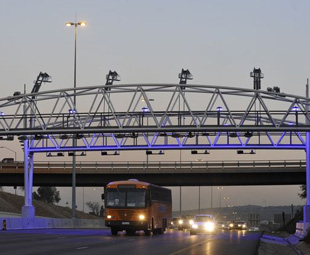Foreigners look out! E-tolls might get you locked up …

It’s been a year since e-tolls went live on the Gauteng Freeway Improvement Project (GFIP) toll roads. It now seems that there may soon be a new set of rules … The minister of transport has published various amendments to the “e-road” regulations in Government Gazette 38257 for public comment – which closes on December 27, 2014.
They include a requirement that “foreigners” must now comply with the provisions relating to the payment of toll tariffs on GFIP toll roads, in terms of section 27(1)(b) of the Act.
Justice Project South Africa (JPSA) points out that the proposed amendment implies that those who drive motor vehicles registered outside of South Africa have been exempted from the so-called “user-pays principle” on the GFIP.
JPSA adds that the other amendments (published in this Gazette for comment) apply to the time frames that the South African National Roads Agency Limited (Sanral) has in which to issue an invoice to both registered and non-registered users.
“This period is to be extended from 32 to 60 days; however, the ‘seven days grace for payment’, applicable to the tariffs for registered e-tag and vehicle licence number (VLN) users, as well as the ‘seven days grace for payment’ applicable to standard tariffs, has not been adjusted,” says JPSA.
There is, therefore, no obligation for Sanral, or its contractors, to wait for a further 53 days to elapse, after the seven day-grace period has expired, before issuing an invoice through the Violations Processing Centre (VPC).
JPSA adds that the final amendment contained in this Gazette is one compelling Sanral, or its agents, to “establish and keep a register to record all transactions of day-pass users and alternate users” – as opposed to doing so only for registered e-tag and VLN users.
“This amendment implies that no obligation has existed for Sanral, or its agents, to establish and keep a register to record all transactions incurred on the GFIP,” notes the non-profit company.
JPSA states that it will be submitting its comments to the Department of Transport with respect to these proposed amendments and will again be questioning what mechanisms have been, or will be, put in place to ensure that owners of vehicles registered outside of South Africa comply with these regulations.
“The way we see it, there are only two ways to ensure that this happens,” it adds. “One is to detain and prohibit them from leaving the country for not paying their e-tolls, and the other is to seek extradition orders for foreign vehicle owners who don’t pay within 120 days of passing under a gantry. Neither is a particularly practical solution.”
JPSA concludes with the question: “What will happen if a ‘foreigner’ returning home cannot pay? Will that person be jailed until they have paid their ‘debt to society’ or will they be allowed 60 days to pay prior to an invoice being issued to them and, upon failing to pay within 120 days, be extradited to stand trial?”
Published by
Focus on Transport
focusmagsa




